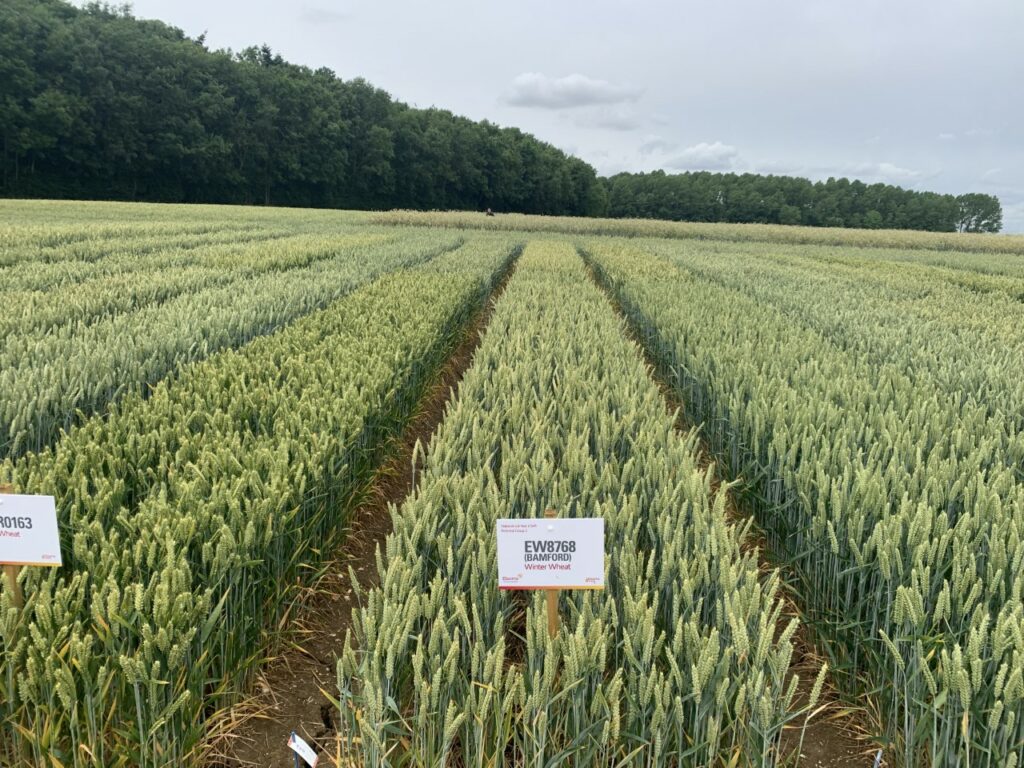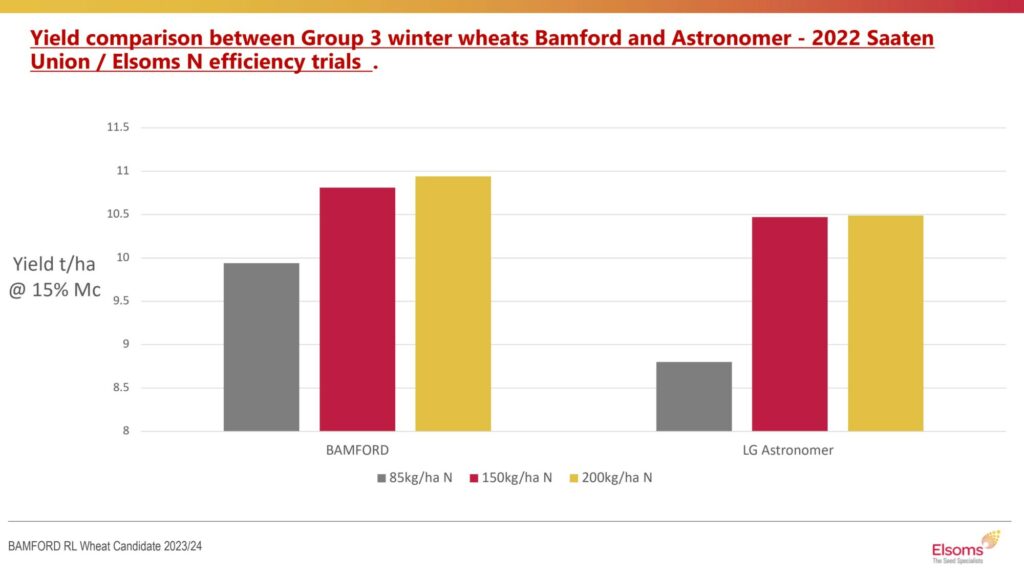Trial data to benefit growers looking to improve variety performance
16th February 2023
Findings from a three-year nitrogen (N) efficiency trial have been labelled as a ‘potential game changer’ for growers looking to enhance farm sustainability and variety performance while reducing the overall cost of N inputs.

Group 3 winter wheat Bamford outyielded LG Astronomer, despite early N sampling tests recording the Astronomer crop as containing a higher amount of N.
Independent seed breeder Elsoms Seeds, in collaboration with German seed breeder Saaten Union, launched a series of trials in 2020 looking at N efficiency in all their candidate varieties and near market lines, Elsoms technical manager George Goodwin confirmed.
“Elsom’s company ambition is ‘Grow more from less’ and the best way to achieve that is to observe how varieties react to Nitrogen in response to differing timings and volumes,” he said.
According to Mr Goodwin, the trials aimed to identify how far N inputs could be reduced without having a drastic effect on yield or quality. Other than determining which varieties are the most N efficient, the findings also revealed the reasons for this increased efficiency, enabling the team to isolate specific genetic traits for future cross breeding.
“The key benefit to our growers is that we can then offer them specific husbandry advice when the variety becomes commercialised, saving them money on the cost of N and potentially time, if we can reduce the number of N applications from 3 to 2 on certain varieties,” he added.
Having run the trials across two sites over the last three years, Saaten Union UK cereal product manager Andrew Creasy believes the data set will enable arable farmers to increase crop productivity while reducing artificial inputs.
“Over the last 3 years, we’ve annually assessed 10 different winter wheat varieties including 3 controls, across 4 different Nitrogen regimes. The rates we looked at were zero N, 85kg of N – early applied, 150kg of N applied in 2 splits, and finally 200kg of N applied in 3 splits of 50, 100 and then 50kg.
“Trials were replicated twice each year, on heavy soils at our Cowlinge trial site, and then on lighter soils at our site near Bury St. Edmunds in Suffolk to give us the widest performance comparison across different soil types,” he added.
While the research is still ongoing, Mr Creasy revealed several important discoveries that have already been made.
“One significant result is that of the varieties we’ve trialled, many with French and German parentage, have yielded better when 150kg of N is applied early in the season in 2 splits, than under the longer 3-phase approach of applying 200kg of N.
“Given the recent predominance of dry spring and summer weather it’s clear that much of the late applied N is not getting into the plants due to a lack of soil moisture. However, there’s also enough evidence in the data to suggest that the varieties with German and French parentage perform much better when N is front loaded, regardless of weather conditions – given that not every year has been consistently dry between 2020 and 2022.
“The 2021 N efficiency trials also gave us a revealing insight into optimising yields from the Group 2 milling wheat Mayflower. When 85kg of N was applied early, Mayflower outyielded competitor variety KWS Extase and when both varieties received 150kg of N, applied early across 2 splits, there was no difference in yield between the 2 varieties,” he explained.
Alongside Mayflower, other varieties have also demonstrated positive effects, Mr Creasy added.
“In the 2022 trial, the Group 3 wheat Bamford outyielded LG Astronomer, despite early N sampling tests recording Astronomer as containing a higher amount of N than Bamford at the early flag leaf growth stage.
“This demonstrated that Bamford was able to make better use of its N than Astronomer in the same growing conditions, and across all input regimes, in 2 different sites,” he remarked.
The performance of Bamford and LG Astronomer in the 2022 trials is illustrated in the graph below:

Graph comparing Bamford and Astronomer yield based on 2022 trials.
Commenting on the results, Mr Creasy said: “Taking varieties out of their comfort zone to find their optimum level of N for yield and quality is a significant step forward when looking to develop new varieties that are able to express the same use efficiency characteristics.
“Our future objective will be to pass this key husbandry advice onto agronomists and growers to support them in their variety decision making process,” he concluded.
